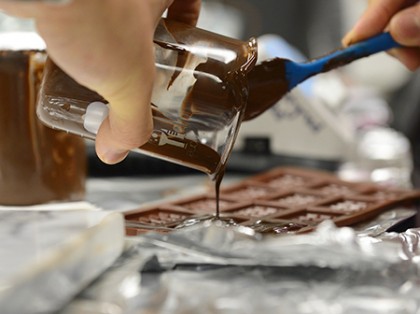Even the most die-hard chocolate lovers probably haven't considered what the confection looks like on a molecular level. Just ask Victoria Michael, one of the students who took "Chocolate: An Introduction to Materials Science" during Johns Hopkins University's intersession.

Image credit: Will Kirk / Johns Hopkins University
"It's incredibly cool to get a totally new perspective like this on chocolate, which is something we see all the time and don't really think about," the junior international studies major said. With its craggy surface studded with crystals of sugar and chubby globules of cocoa butter, chocolate, under a scanning electron microscope, resembles the surface of an alien planet.
Offered through the Whiting School of Engineering's Department of Materials Science and Engineering, the course introduced 20 students to basic concepts in materials science, including phase diagrams, crystallization, and various characterization techniques—all through one of humankind's favorite treats.
Also see
"OK, I admit it—I am a bit of a chocoholic," said Jennifer Dailey, the course's instructor, a doctoral student in materials science and engineering, and a National Science Foundation graduate research fellow. She created the class in conjunction with the "Teaching as Research" program at the University's Center for Educational Resources, collecting data to ascertain whether teaching students scientific concepts through something that they are familiar with and excited about (in this case, chocolate) helps them learn and retain the material as well as or better than students who learn in a more traditional lecture class.
"My goal for this course was to introduce students to materials science, and to make materials science and engineering more accessible," Dailey said. "It definitely worked. I think it's fair to say that the course got many students excited about science and engineering."
The course worked so well, in fact, that one student switched her major from traditional biology to biomaterials, an option available within the School of Engineering's materials science and engineering major.
"The data seem to indicate that when learning scientific concepts in the context of something fun, students who started at a lower level of knowledge were able to retain the same amount as students who came in at a higher level and were exposed to a more traditional lecture materials science class," she said. "Plus, they had fun!"
Posted in Science+Technology, Student Life
Tagged materials science, engineering, intersession







